Taco Hydroflo Pump Solutions has opened a new state-of-the-art facility in Lubbock, Texas. The site opened on February 21, and substantially expands the operations of the Taco Family of Companies. Taco is headquartered in Cranston, RI. Hydroflo’s new 45,000 s.f. location in Lubbock, Texas, is in the manufacturing and transportation hub of northwest Texas, 40 Read more
Pumps

Taco Hydroflo Pump Solutions has opened a new state-of-the-art facility in Lubbock, Texas. The site opened on February 21, and substantially expands the operations of the Taco Family of Companies. Taco is headquartered in Cranston, RI.
Hydroflo’s new 45,000 s.f. location in Lubbock, Texas, is in the manufacturing and transportation hub of northwest Texas, 40 miles north of its prior location in Brownfield, Texas. With the new facility also comes the advantage of added space for future growth, additional capabilities and team expansion.

“The opening of this new Taco Hydroflo Pump Solutions facility signifies a renewed focus on ensuring that our customers have access to the most dependable high quality vertical and submersible pumps in the market,” noted Cheryl Merchant, President and CEO, Taco Family of Companies. “Our investment in the infrastructure, testing equipment and expanded workforce is just the beginning of the next phase of the Hydroflo story.
“I would like to extend my thanks and gratitude to our new landlord, Randy Teinert, the City of Lubbock, and the Lubbock Chamber of Commerce,” continued Merchant. “Family is at the core of everything we do at Taco, and I want to thank all of you for making us feel like family. Your warm welcome to this community has made all the difference.
“The Hydroflo team, along with the more than 1,200 Taco team members, are leading us into the future,” she added. “A future of opportunity, a future of growth and a future of well-earned success.”
According to Hydroflo’s Director of Sales, Clay Williams, the facility substantially expands their manufacturing, warehouse and quality control operations. New manufacturing equipment was purchased for the facility, and a state-of-the-art test pit have expanded their testing capabilities as well.
“The new test pit is much larger and deeper and greatly improves our range of testing,” explained Larry Jones, Hydroflo VP. “We now have the ability to test all current pump models, something we previously had to outsource.”
Hydroflo manufactures a wide range of submersible turbine, vertical axial-flow, vertical mixed-flow, and vertical turbine pumps for use in the agricultural, commercial, industrial, municipal, marine, mining, and power generation markets. The company uses high-quality ductile iron discharge heads and fabricated steel or 316 stainless steel L, F, and T style heads. Ductile Iron bowl castings with impellers in 201 stainless steel impellers are also used for greater strength. For applications that require resistance to corrosion, Hydroflo offers castings and impellers in 316 stainless steels in order to provide the best materials of construction to meet specific application needs.
Taco Hydroflo Pump Solutions is an integral part of the Taco Family of Companies, an expanding global network of industry-leading brands that strive to be the first source for durable, high-efficiency heating, cooling, plumbing and fluid-control solutions that help its customers save money, energy and resources while maximizing comfort and productivity.
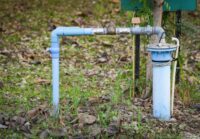
Private well water is not filtered and disinfected before entering a home, unlike municipal water. Even though well water is exempt from specific requirements for public water sources, it still needs to be clean and safe to consume. Installing a well water treatment system is necessary to eliminate typical well water impurities such as coliform Read more
Private well water is not filtered and disinfected before entering a home, unlike municipal water. Even though well water is exempt from specific requirements for public water sources, it still needs to be clean and safe to consume. Installing a well water treatment system is necessary to eliminate typical well water impurities such as coliform bacteria, iron, nitrates, and sulfate.
When removing undesirable components from a well water, distillers, whole-house water filters, water softeners, and disinfection systems are all viable solutions. This is true in all areas of the country, in fact, check out residential well drilling in Indianapolis for information in that area.

How Well Water Gets Adulterated
Most well water requires little filtering if the screen and pump are kept in good condition. But there are several ways for a well to get polluted.
It is simple for toxic substances to leak into the aquifer and contaminate the groundwater close to your well, or polluted water can enter improperly built or neglected wells. Private well owners should be mindful of any surrounding land-use activities that could have a detrimental impact on groundwater quality. This includes livestock grazing and feeding activities, insecticides, herbicides, fertilizers, and unlawful disposal.
Additionally, putting septic tanks too close to a well will contaminate your freshwater source if there is a sewage leak. In addition, the water supply can be contaminated by naturally occurring substances like iron and manganese, as well as runoff from populated regions.
Keeping Up Water Well
Ensure a sufficient water supply and ongoing water safety. To assure water quality, a testing facility should test well water yearly for E. coli and total coliform bacteria.
Extensive testing is advised every three years for total dissolved solids, pH, and tests about land use that is now taking place or anticipated to occur near the well. Additionally, seek tests that will assist in determining the cause of any overt stains, tastes, or smells in the water.
Yearly inspections of water wells are also recommended for evidence of harm or pollution. Make sure the 100 feet surrounding the well are free of any objects or debris that might contaminate the water.
Well Water Treatment System
You must accurately assess the well water quality and grasp how the well water treatment system functions to have the best and most effective treatment system.
Most water treatment methods work best under certain circumstances. For instance, the well water in this area is naturally acidic and contains iron. Since many iron filtration systems cannot wholly remove iron from acidic water, the acidity of the well water must first be handled.
The well water must be checked for chemical pollutants, bacteria, unpleasant tastes and smells, and stains before selecting a well water filter system. In addition, iron, manganese, total dissolved solids, pH, calcium, hardness, alkalinity, turbidity, arsenic, nitrate, and other substances must also be analyzed.
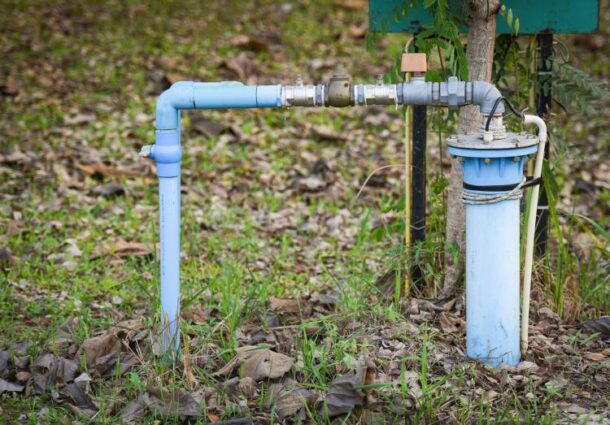
Different Well Water Treatment Systems
There are multiple varieties of well water treatment systems, each designed to eliminate certain impurities from your water source. These systems consist of:
- Water Softeners
- Whole House Filters
- Reverse Osmosis Systems
- Chemical Disinfection Systems
- UV Disinfection Systems
- Distillation Systems
What Is The Cost Of Treating Well Water?
It varies depending on the approach you choose. Some home systems utilize more hardware and need more upkeep than others. Some well-related systems cost more money upfront but require little maintenance or special care throughout their lifespan.
Hydrowells Well Water Treatment System
Hydrowells team is pleased to provide a 100% client satisfaction promise and an on-time guarantee. In addition, we ensure that our staff members are well qualified and outfitted to handle the variety of well-servicing requirements for your house result.
Our objective is to offer our clients extremely competent well drilling services. We take pleasure in providing consumers with dependable, warm service they can rely on. For any emergency, our knowledgeable crew is on call around-the-clock.

PumpMan® Expands Southern California Coverage with Acquisition of Ransom Pump & Supply in Ramona, California PumpMan®, a leader in the sales, service, maintenance, and repair of pumps, motor, and control systems in the United States, announces the acquisition of Ransom Pump & Supply based in Ramona, CA. Ransom Pump & Supply will join PumpMan’s Read more
PumpMan® Expands Southern California Coverage with Acquisition of Ransom Pump & Supply in Ramona, California
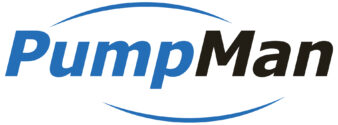 PumpMan®, a leader in the sales, service, maintenance, and repair of pumps, motor, and control systems in the United States, announces the acquisition of Ransom Pump & Supply based in Ramona, CA. Ransom Pump & Supply will join PumpMan’s Baldwin Park-based PumpMan SoCal and PumpMan San Diego in serving, the commercial, industrial, municipal, agriculture and multi-unit residential pump systems in Los Angeles, Orange, San Bernardino, Riverside, San Diego, and Imperial counties.
PumpMan®, a leader in the sales, service, maintenance, and repair of pumps, motor, and control systems in the United States, announces the acquisition of Ransom Pump & Supply based in Ramona, CA. Ransom Pump & Supply will join PumpMan’s Baldwin Park-based PumpMan SoCal and PumpMan San Diego in serving, the commercial, industrial, municipal, agriculture and multi-unit residential pump systems in Los Angeles, Orange, San Bernardino, Riverside, San Diego, and Imperial counties.
Ransom Pump & Supply designs, services, repairs, and installs complete residential and commercial well based freshwater systems. These complete systems include pumps, motors, system controls, water storage and pressure boosters, and include generators or solar panels as back-up power supplies to ensure service reliability.
“Since 1924 Ransom Pump & Supply has been serving the agricultural, municipal, and residential markets throughout Ramona and San Diego County California. Our focus is to provide the highest quality of customer service, as well as the design of efficient productive pump and electrical systems” – Sommer Adams, General Manager Ransom Pump & Supply
“PumpMan’s goal is to expand our presence throughout Southern California with multiple locations and expanded service capabilities. Ransom’s focus on well pumping systems is a nice complement to our Pumpman SoCal capabilities and provides the local community with access to groundwater water supplies as California continues to experience severe drought conditions. We will be expanding Ransom’s staffing levels and capacity as market demand requires” said Donald Devine CEO of PumpMan, LLC.
Ransom Pump & Supply will continue operate with its full staff of pump technicians, field service mechanics, and administration personnel at the facility located at 533 B St, Ramona, CA 92065 24/7 Service is available 760-789-5955.
More information at: www.ransompump.com, www.pumpman.com
Taco Comfort Solutions donated $25,000 to Tunnel to Towers Foundation during an event held on June 15 at Wales Darby’s Islandia, N.Y. facility. Taco teamed up with their New York manufacturer’s rep, Wales Darby, to run a contractor promotion in the Long Island area supporting Tunnel to Towers. Taco donated proceeds from Taco heating circulators Read more
Taco Comfort Solutions donated $25,000 to Tunnel to Towers Foundation during an event held on June 15 at Wales Darby’s Islandia, N.Y. facility.
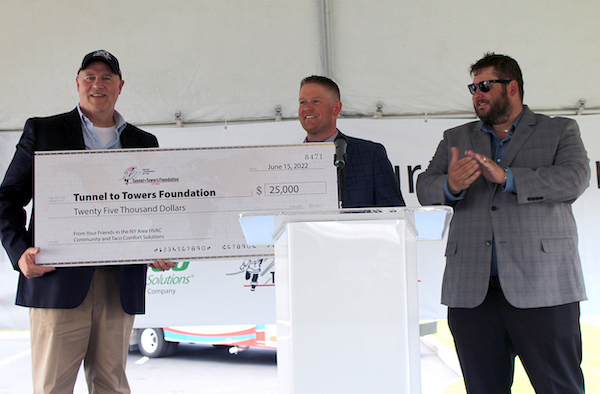
From left to right, Tunnel to Towers Foundation representative Andrew McClure receives a check for $25,000 from Taco Comfort Solutions’ Benjamin White, Manager, Supply Chain, and John White, III, Sr. Vice President, OEM Sales.
Taco teamed up with their New York manufacturer’s rep, Wales Darby, to run a contractor promotion in the Long Island area supporting Tunnel to Towers. Taco donated proceeds from Taco heating circulators sold during a four-month period to Tunnel to Towers.
Tunnel to Towers Foundation supports families of fallen and severely injured military and first responders by providing mortgage-free homes.

It doesn’t seem so long ago we were fending off the “green” movement that was being force-fed into the vocab of working contractors. From green building to green technology, greenwashing was so prevalent that really the only “green” contractors were concerned with was the one they were chasing every day—a profit. But alas, a new Read more
It doesn’t seem so long ago we were fending off the “green” movement that was being force-fed into the vocab of working contractors. From green building to green technology, greenwashing was so prevalent that really the only “green” contractors were concerned with was the one they were chasing every day—a profit.
But alas, a new word has dominated the marketing lexicon—“smart.” Smart cars, smart phones, smart homes and yes, even smart pumps. “The problem is they’re not that smart,” says John Barba, contractor training manager, Taco Comfort Systems. “I’ve heard people who you’d think would know better say idiotic stuff like ‘these pumps do the thinking for you,’ and ‘they take the thinking out of it,’” says Barba.

Image Credit: Noven; Bethesda.net
How about giving credit to the users who actually interact with such devices? “The thing that separates the professional from the DIY’er or the handyman is his or her ability to think and their understanding of systems. That’s why people hire professionals, and that’s why our profession is so valuable. When it comes to systems and components, the professional is the smart one,” says Barba
“The professional knows what he’s holding in his hands, why he’s using it and what impact it’s going to have on the overall system performance. There’s not a pump made that can replace what the pro knows. The machines haven’t taken over yet,” continues Barba.
Intelligent Systems
If the integration or connectivity of disparate components to a holistic, communicative system is considered smart, then I’m buying in. Why not just say that in the first place? Because it’s not market-y, and it’s too long for a tagline. Okay, then the evolution of homebuilding can be categorized as being smart or intelligent because the integration of, say, lighting, security, home entertainment, etc., can be accessed from the convenience of your smart phone (more on that later). But I’d say that is more a matter or convenience than smarts.
In fact, as part of these communicative devices, perhaps on a broader, commercial stage, we are witnessing new phrases popping up such as the Internet of Things (IoT). According to Sokwoo Rhee, former associate director of the Cyber-Physical Systems Program at the National Institute of Standards and Technology (NIST) from 2014 to 2021, IoT can be described as the advancements in sensors and communication technologies that enable us to collect data which was not previously practical; the explosive increase of the amount of collected data enabled us to perform analytics which was not previously practical or meaningful; and the advancements in data analytics that will enable us to better control and optimize the systems to benefit our daily life. Again, I can buy into that.
Remember when cell phones were labeled smart phones? I think they still are. It’s 2007 and my fancy handheld device can make calls and perform functions as a computer. Well guess what? Today, they are just considered phones. And, if they don’t perform almost any function you can think of, well, then perhaps they are just dumb.
And, oh yeah, what makes a smart car? Good gas mileage? Actually, the term Smart Car came from a venture between watchmaker Swatch and Mercedes-Benz, with Smart standing for Swatch Mercedes Art, a branding stroke of genius. Its small stature was designed for city driving with big gas savings and easy maneuverability, with not-so-good safety ratings, I’d imagine. Debuting in the U.S. in 2008, last I read, it was discontinued in 2019.
And back to those smart, magical pumps? “The only word I hate more than ‘smart’ is ‘magic,’” says Barba. “Anyone who says something like that really doesn’t know how ECM circulators really work, or how they interact with systems. No matter how ‘smart’ people claim these things are, you can’t get away from the fundamentals of circulators. These things have performance—or ‘control’ curves—and the system still has a system curve,” says Barba.
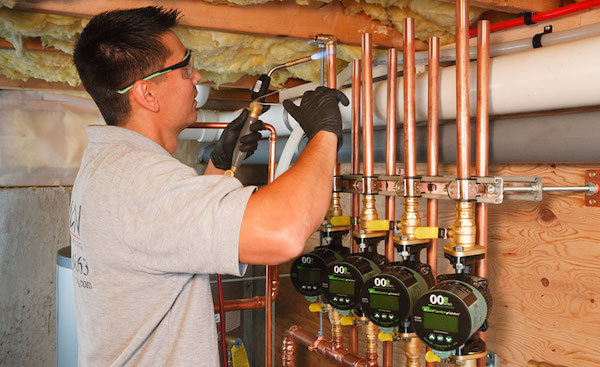
According to Barba, there’s no such thing as magic, and the only circulator that can even come remotely close to sizing itself is the Taco VT2218—it’s a Delta-T circulator and varies its speed to maintain a fixed delta-T in the system.
“And I don’t care how many lights and buttons you put on the circulator, you can’t change the fact that when you have a fixed performance curve—as every Delta-P variable speed circulator has—the system has to work where the system curve intersects the control curve. If it’s a zone valve system, speed and flow will change as zone valves open and close, but it still works on the selected control curve. If it’s a zone pump system, a Delta-P circulator won’t vary its speed because there’s nothing in a zone that would create a change in pressure differential. It goes one speed and that’s it. That’s not what I’d call smart.
“Now, that doesn’t mean you shouldn’t use a Delta-P pump as a zone pump. You should—it’ll do some pretty cool things for you provided it’s set up properly. And for that, you need a smart installer who understands what these circulators do, what they don’t do and how they interact with the system,” says Barba.
“Just because a circulator is variable speed, that doesn’t make it magic. This isn’t Hogwarts and you’re not Harry-freaking-Potter.”
What’s my point in all of this? Dig deeper, educate yourself, rely on your experience and knowledge, and don’t rely on marketing taglines such as Smart or Green to sell you completely on something.
